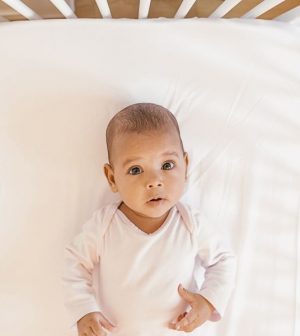- Could Your Grocery Store Meat Be Causing Recurring UTIs?
- Are You Making This Expensive Thermostat Error This Winter?
- Recognizing the Signs of Hypothyroidism
- 10 Strategies to Overcome Insomnia
- Could Artificial Sweeteners Be Aging the Brain Faster?
- Techniques for Soothing Your Nervous System
- Does the Water in Your House Smell Funny? Here’s Why
- Can a Daily Dose of Apple Cider Vinegar Actually Aid Weight Loss?
- 6 Health Beverages That Can Actually Spike Your Blood Sugar
- Treatment Options for Social Anxiety Disorder
Keeping Baby Safe: Follow These Tips to Lower Sleep Risks

It’s always a good time to check your baby’s sleep space.
The U.S. Consumer Product Safety Commission (CPSC) has released its annual report on the topic, showing that risks associated with nursery products continue to be high. More than 160 babies die each year related to nursery products, including in unsafe sleep environments.
But the CPSC offered some tips for infant sleep safety.
Parents and caregivers should only put their babies to sleep in products meant for safe sleep, including bassinets, cribs and play yards.
If a baby falls asleep in another place, move that baby to a crib, bassinet or play yard.
Reduce suffocation hazards, such as soft bedding, including blankets, pillows and stuffed toys, the CPSC urges.
“It is important for families to remember that the ways many adults sleep are not safe for young children,” CPSC Chair Alex Hoehn-Saric said in a commission news release. “CPSC’s message on safe sleep is simple: ‘bare is best,’ which means a firm, flat surface in a crib, bassinet or play yard, without blankets, pillows or other items. If your baby falls asleep in an inclined product, move them to their crib, bassinet or play yard.”
Between 2018 and 2020, there was an average of 100 deaths each year, most of which were associated with the presence of extra bedding. There were an annual average of 15 deaths associated with inclined infant products, which are not intended for sleep.
Black children were disproportionately impacted by nursery-product related deaths. About 29% of the deaths were among Black children, although they are only 16% of the population.
In 2022 alone, an estimated 59,500 children under age 5 were treated at emergency departments with injuries associated with nursery products, the report showed.
You can check the CPSC’s website for recalls and also sign up to receive recall notifications. Always check for recalls when you buy something, including on secondhand products.
More information
The American Academy of Pediatrics has more on sleep safety.
SOURCE: U.S. Consumer Product Safety Commission (CPSC), news release, Sept. 21, 2023
Source: HealthDay
Copyright © 2026 HealthDay. All rights reserved.










